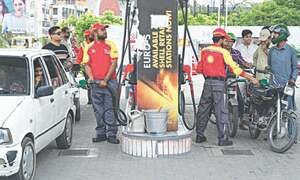MUNICH, Feb 5: Alarm over Iran’s nuclear programme dominated a three-day security conference which ended here on Sunday as top officials struggled in vain to find common ground on further action to force a shift in Tehran’s nuclear stance.
Echoing the official US position, leading American senators insisted that military strikes against Tehran — and a minimum of sanctions — could not be ruled out.
“Every option must remain on the table. There is only one thing worse than a military showdown and that is a nuclear-armed Iran,” said US Senator John McCain, who is viewed as a Republican Party frontrunner in the 2008 race for the US presidency.
US Secretary of Defence Donald Rumsfeld said: “The Iranian regime is today the world’s leading state sponsor of terrorism. The world does not want — and must work together to prevent — a nuclear Iran.”
But Russian Deputy Prime Minister and Defence Minister Sergey Ivanov poured cold water even on the idea of sanctions, saying he doubted they would work.
“I am not sceptical but a bit pessimistic on sanctions,” Mr Ivanov said, adding that he was not sure Iran’s neighbours would abide by international sanctions.
Mr Ivanov told reporters that Russia wants Iran’s nuclear programme to be resolved under the auspices of the International Atomic Energy Agency (IAEA).
He expressed reservations about Saturday’s decision by the IAEA to refer Iran to the United Nations Security Council, underlining that the world body would only consider the issue, not decide any concrete actions.
As American and European officials slammed Iran for trying to develop nuclear weapons, Mr Ivanov insisted that Iran had the “legal sovereign right to enjoy the fruits of nuclear energy”.
These stark differences on how to deal with Iran appeared to confirm that there is no overall strategy over what to do if the Iranian government refuses to climb down.
















































Dear visitor, the comments section is undergoing an overhaul and will return soon.